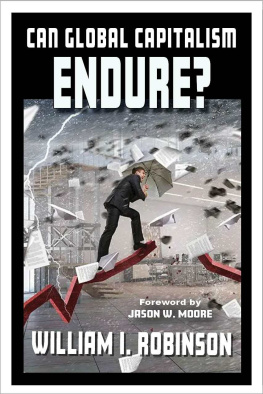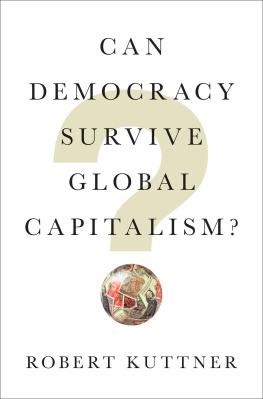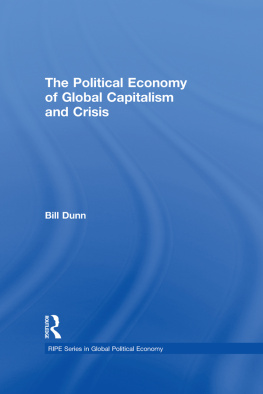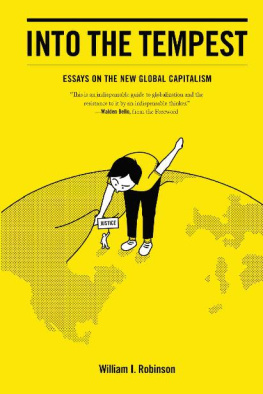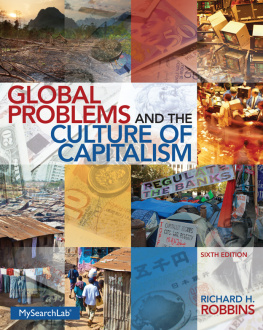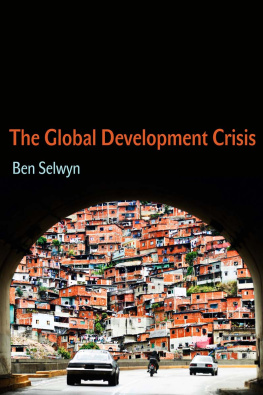Can Global Capitalism Endure?
Can Global Capitalism Endure?
WILLIAM I. ROBINSON

2022 William I. Robinson
ISBN: 978-1-949762-56-3
EBOOK ISBN: 978-1-949762-63-1
In-house editor: Diana G. Collier
Book design: Becky Luening
ALL RIGHTS RESERVED: Except for purposes of review, this book may not be copied, or stored in any information retrieval system, in whole or in part, without permission in writing from the publishers.
Library of Congress Control Number: 2022934371
Clarity Press, Inc.
2625 Piedmont Rd. NE, Ste. 56
Atlanta, GA 30324, USA
https://www.claritypress.com
Table of Contents
Acknowledgments
KIND THANKS to Roberto Danipour, the late Neil Faulkner, Venus Leung, Steven Osuna, Kees van der Pijl, and Hilbourne Watson for their invaluable comments and suggestions on earlier drafts of this essay. I have been discussing the ideas raised here in a number of professional and political forums. Special thanks to Juan Manuel Sandoval and to Marcela Orozco, who have invited me over the past few years to give talks on the global crisis to the Seminario Permanente de Estudios Chicanos y de Fronteras of the National Institute of Anthropology and History (INAH) of Mexico, to the Working Group on Borders, Regional Integration and Globalization in the American Continent of the Consejo Latinoamericano de Ciencias Sociales (Latin American Social Science Council), and to several other professional forums in the Americas. Thanks also to Germn Carrillo, who invited me to contribute an article to the inaugural issue of Revista de Estudios Globales, Anlisis Histrico y Cambio Social, which served as the original inspiration for the present study. Needless to say, I alone am responsible for the work and for its inevitable shortcomings.
FOREWORD
Global Capitalism in the Great Implosion: From Planetary Superexploitation to Planetary Socialism?
Jason W. Moore
E very paragraph of Can Global Capitalism Endure? sizzles with insights. Here is William I. Robinson at his best: empirically sensitive, theoretically original, politically committed. Global Capitalism, in this groundbreaking formulation, is no amalgamation: global plus capitalism. It identifies, rather, an emergent and profoundly unstable phase of capitalismhence the upper-casegrowing out of neoliberalisms gruesome contradictions.
This book unfolds a world-historical trinity: globalization, financialization and digitalization. Robinson charts these in their shifting configurations of the ongoing overaccumulation crisis, the worldwide class struggle, and Biospheric tipping points. Grasping these moments as mutually formative, he achieves the near-impossible: a lucid primer on the great fractures of capital, class, and political power while elaborating an original theory of capitalist crisis. This interpretation presages capitalisms possible transformation from a world-economy of many competing states and capitalist blocs into a tributary civilization governed by a relatively unified gang of oligarchs. Of course, Robinson understands this dynamic as a tendency, not a done deal. Global Capitalism forms through and creates counter-tendenciesnot least the potential emergence of working-class internationalisms. He explores the contradictions faced by the global bourgeoisie in its attempt to morph into a transnational capitalist class (TCC), whose runaway financializationreinforced by militarized accumulationrenders it unable (or perhaps unwilling?) to re-establish the conditions for another capitalist golden age.
Two themes shape this question. One is Global Capitalisms ascendancy since 2008 and the Great Recession. Here we see a hyper-financialized TCC and its incipient transnational state apparatuses (TNS) maturing. Global Capitalisms financialization is distinguished by an unusually predatory relation to non-financial capitalist firmsalong with the rest of life. In my reading, this predatory movement represents the world-historical crystallization of hedge-fund-style asset Broadly defined, this conversation is a political and intellectual effort to rethink capitalism, socialism, and planetary justice through capitalisms evolving relations of power, profit and lifehistorically, and in the present crisis.
Can Global Capitalism endure? Probably not. As Robinson illustrates, the ongoing breakdown of the five-century capital accumulation model is at once producer and product of a novel political project pursued by a critical fraction of the imperialist bourgeoisiethe TCC. Lets call it the Davos Project, after the annual meetings of the planets oligarchs in the Swiss resort village. This Project aims at a political resolution to capitalisms twofold crisis of profit-making and life-making. It is an unsavory cocktail of green techno-authoritarianism, totalizing surveillance, the financialization of everything, and regime change imperialism. In polite company, this is called the Great Reset.of production. While many features of capitalism would persist, the accumulation of socioecological wealth would be definitively guaranteed by something resembling what Robinson refers to in the abstract as TNS apparatuses.
Would this be more or less dystopianor just differentfrom historical capitalism? One thing can be certain. The tendency towards militarized accumulation that Robinson discusses and its gravitational influence in world accumulation has accelerated in recent decades. Since the 1970s, the expansion of a permanent war economyincluding Americas Forever Warshas gone hand-in-hand with a pathological and predatory financialization. Theyve gone together because debt collection is, and always has been, a dirty business. Both signal the historical exhaustion of the conditions for capitalist renewal. Both are fundamental to the tributary ambitions of the Davos Project and its Great Reset.
What underpins this epochal crisis? The crux of the matter is the problem of surplus capitalsurplus relative to the opportunities for profitable reinvestment (without which, capital as such does not exist.) While Marxists debate its specific dynamics, everyone agrees this is the basic problem. Capitalisms dynamism is such that Mr. Moneybags accumulates wealth beyond what can be reinvestedor even spent. (Some of this can be spent on private islands and super yachts. But only some.) Capitals real basiseven and especially If new investment opportunitiesrelative to the rising mass of capitaldo not materialize, crises of variable severity follow.
These various cycles correspond to the severity of the surplus capital problem. This is the difference between business cycle recessions and Great Depressions. Today, the problem is similar, yet different. The surplus capital problem asserts itself in increasingly intractable forms. As Robinson reminds us, financialization is always bound to the real economy. The proliferation of fictitious financialization amplifies non-productive claims on the anticipated flows of real wealth derived from the soil and the worker. But there are limits on these anticipated flows, and Robinson illuminates them. Financial capitalisms totalizing fantasy runs aground on the shoals of simmering class revolt and overaccumulation, which this time aroundin contrast to previous eras of systemic crisiscannot be attenuated by further rounds of primitive accumulation and commodification. The enclosure of capitalisms last great frontiers of Cheap Nature since the 1970s has removed the indispensable way that empires have resolved overaccumulation crises. Simply put, globalization has rendered a whole series of unprofitable investments profitable, such that a new working class that can labor at five cents on the dollar of workers in the imperialist centersor $20/barrel oil equivalents.
Next page
